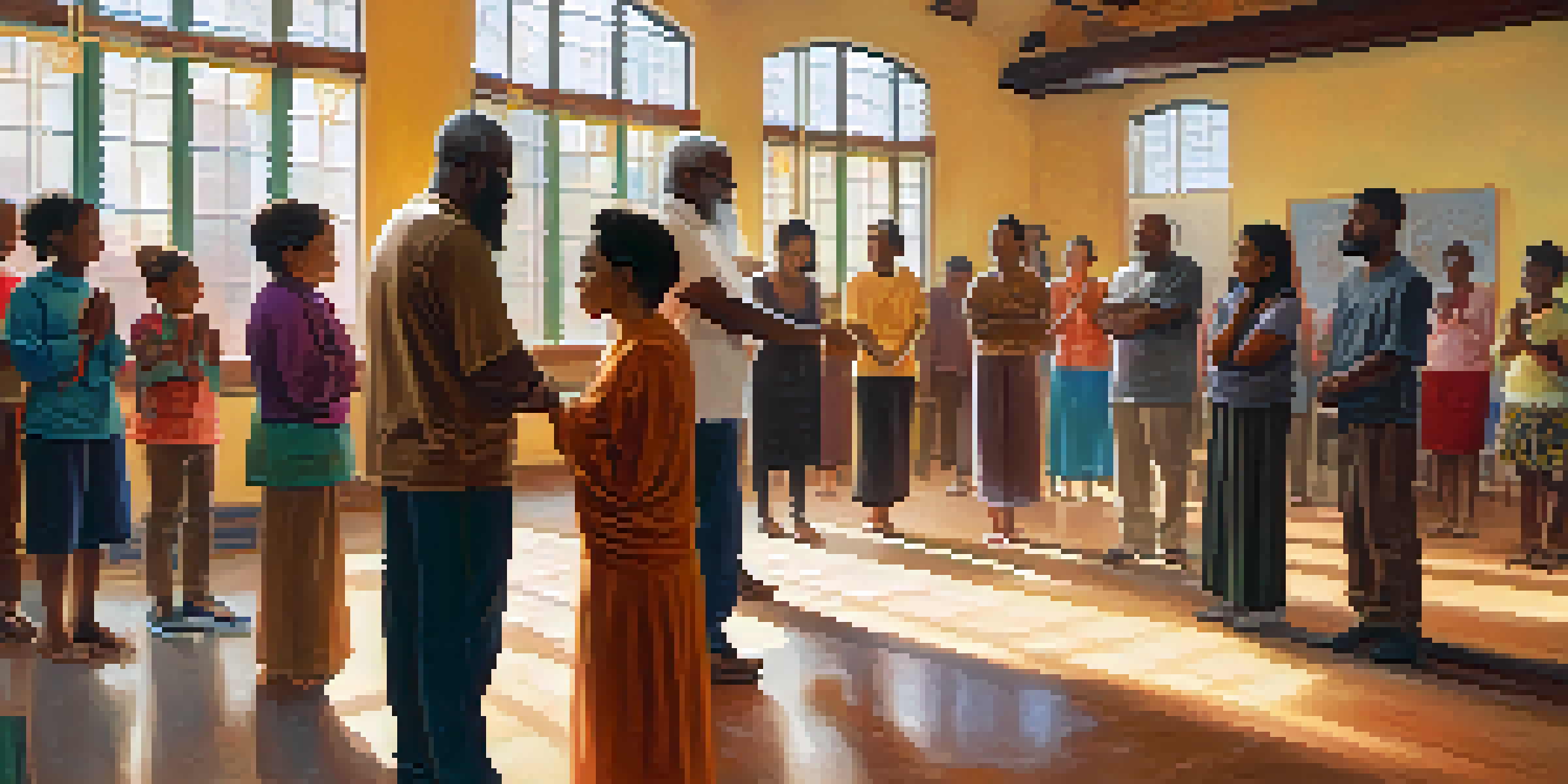The Influence of Prayer in Resolving Community Disputes

Understanding the Power of Prayer in Communities
Prayer has long been a source of strength and unity in communities. It serves as a collective practice that brings people together, fostering a sense of belonging and shared purpose. When individuals come together to pray, it can create a bond that transcends personal differences, allowing for open communication and understanding.
Prayer does not change God, but it changes him who prays.
In many cultures, prayer is more than just a spiritual exercise; it’s a communal activity that reinforces social ties. This sense of togetherness can be especially beneficial during times of conflict, as it encourages empathy and compassion among participants. By focusing on common values and intentions, communities can find common ground to address their disputes.
Moreover, prayer often invites a higher perspective on issues at hand, encouraging individuals to reflect on their actions and motivations. This reflective process can lead to personal growth and a willingness to forgive, which are crucial in resolving conflicts effectively. Ultimately, prayer can transform the atmosphere of a community from one of division to one of unity.
Case Studies: Prayer in Action
Numerous communities around the world have successfully used prayer to resolve conflicts. For instance, in some neighborhoods facing social unrest, local religious leaders have organized prayer vigils to promote peace and dialogue. These events not only bring people together but also open channels for discussion, allowing grievances to be aired in a respectful environment.

In places where ethnic or cultural tensions exist, interfaith prayer gatherings have proven effective in fostering understanding. By inviting diverse groups to pray together, participants can learn about each other’s beliefs and perspectives, breaking down stereotypes and building trust. This approach encourages community members to view each other as allies rather than adversaries.
Prayer Fosters Community Unity
Collective prayer practices bring individuals together, enhancing empathy and understanding within communities.
Additionally, in post-conflict regions, prayer has played a pivotal role in healing wounds and rebuilding relationships. Communities often hold prayer ceremonies that commemorate those lost to violence while also celebrating resilience and hope for the future. These gatherings can help individuals process trauma and find solace in shared experiences.
The Psychological Benefits of Prayer in Conflict Resolution
Engaging in prayer during disputes can significantly reduce stress and anxiety. The act of praying allows individuals to express their concerns and feelings, providing an emotional release that can be therapeutic. This can create a calmer environment where rational discussions can take place, rather than heated arguments.
To be a Christian without prayer is no more possible than to be alive without breathing.
Moreover, prayer often cultivates a mindset of forgiveness, which is essential in conflict resolution. When individuals focus on their spiritual beliefs, they may feel inspired to let go of grudges and seek reconciliation instead. This shift in mindset can lead to more constructive dialogues, where solutions are prioritized over blame.
The communal aspect of prayer also plays a vital role in individual mental well-being. Knowing that others are praying for you can instill a sense of support and solidarity, which helps individuals feel less isolated during difficult times. This emotional backing can encourage individuals to approach disputes with a more open heart and mind.
Creating Safe Spaces for Prayer and Dialogue
Establishing safe spaces for prayer and dialogue is crucial for effective conflict resolution. These spaces can be physical locations, like community centers or places of worship, or they can be virtual platforms that allow for broader participation. The key is to create an environment where everyone feels comfortable expressing themselves without fear of judgment.
Facilitators or leaders can help guide these prayer sessions to ensure that they remain respectful and constructive. Encouraging participants to share their stories and insights can lead to deeper understanding and empathy among community members. This approach not only strengthens interpersonal relationships but also builds a collective commitment to resolving conflicts peacefully.
Leaders Enhance Prayer Initiatives
Community leaders play a crucial role in promoting and facilitating prayer activities, ensuring inclusivity and effective dialogue.
Additionally, incorporating elements of meditation or mindfulness can enhance these gatherings, allowing participants to center themselves before engaging in discussions. By promoting a calm and reflective atmosphere, communities can create a fertile ground for healing and reconciliation.
The Role of Community Leaders in Prayer Initiatives
Community leaders play a vital role in promoting prayer as a tool for conflict resolution. Their endorsement can inspire participation and lend credibility to the initiatives. When leaders actively engage in prayer activities, it sends a powerful message that these practices are valued and necessary for community well-being.
Moreover, leaders can help facilitate dialogue during prayer gatherings, ensuring that all voices are heard. This inclusivity is essential in addressing the root causes of disputes and finding common solutions. By modeling respectful communication, leaders can also encourage others to adopt similar behaviors in their interactions.
In addition, community leaders can collaborate with various organizations, including religious institutions and local NGOs, to expand the reach of prayer initiatives. These partnerships can provide resources and support that enhance the effectiveness of conflict resolution efforts through prayer.
Challenges and Criticisms of Prayer in Conflict Resolution
While prayer can be a powerful tool for community healing, it is not without its challenges and criticisms. Some individuals may view prayer as a passive response to conflict, believing that it replaces the need for actionable solutions. This perception can lead to skepticism about the effectiveness of prayer in truly resolving disputes.
Furthermore, the diversity of beliefs within a community may pose challenges in organizing inclusive prayer activities. Ensuring that all faiths and traditions feel represented can be a delicate balance. It’s important to create a space where everyone feels their beliefs are respected, which requires careful planning and sensitivity.
Challenges in Prayer Practices
Despite its benefits, prayer can face challenges such as perceptions of passivity and the need for inclusive practices among diverse beliefs.
Lastly, there may be instances where prayer alone is insufficient to address deep-rooted issues. In such cases, it is essential to complement prayer initiatives with additional conflict resolution strategies, such as mediation or community dialogue. Recognizing the limitations of prayer while still valuing its role in the process can lead to more holistic approaches to conflict resolution.
The Future of Prayer in Community Conflict Resolution
As communities continue to face various challenges, the role of prayer in conflict resolution is likely to evolve. With increasing globalization and multiculturalism, there is a growing need for inclusive practices that honor diverse spiritual beliefs. By embracing this diversity, communities can create richer and more effective prayer initiatives.
Additionally, as technology advances, virtual prayer gatherings may become more prominent. These platforms can allow for greater participation across geographic boundaries, enabling communities to connect and collaborate on conflict resolution efforts. Digital spaces can be particularly beneficial for those unable to attend in-person gatherings, ensuring that everyone has a voice.

Ultimately, the future of prayer in community conflict resolution will depend on the willingness of individuals to engage with one another openly and respectfully. By remaining committed to the principles of empathy, understanding, and collaboration, communities can harness the power of prayer to foster peace and resolve disputes effectively.